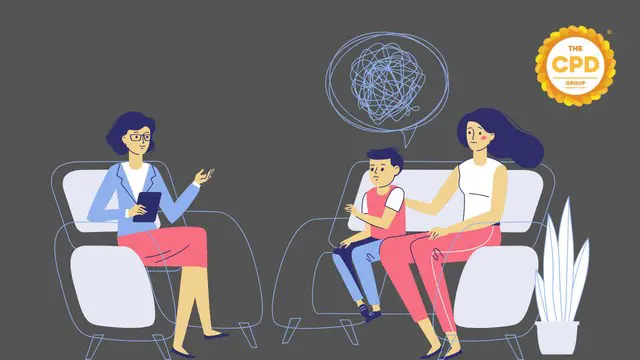
Child Psychology for Effective Parenting
Get Certified in 1.5 Hours| Include Free Certificate & Tutor Support
Learndrive
Summary
- Certificate of completion - Free
- Reed Courses Certificate of Completion - Free
- Tutor is available to students
Add to basket or enquire
Overview
Welcome to the enlightening journey of "Child Psychology for Effective Parenting." In this comprehensive course, you'll gain profound insights into the intricate realm of Child Psychology, equipping you with the knowledge to become an empowered and effective parent. Whether you're a new parent, an experienced caregiver, or simply curious about understanding children better, this course offers invaluable perspectives on child psychology and its applications in parenting.
Learning Outcomes: By the end of this Child Psychology course, participants will be able to:
- Understand the core principles and theories of Child Psychology.
- Recognize the stages of growth and development in children.
- Grasp the significance of attachment theory in childhood.
- Address the impacts of grief, separation, and social development on children.
- Navigate factors influencing child development and parenting challenges.
Curriculum
-
Welcome to Child Psychology Course 00:43
-
Module One: Introduction to Child Psychology 09:47
-
Module Two: Overview of Attachment Theory in Childhood 08:45
-
Module Three: Understanding Privation, Deprivation and Autism 07:02
-
Module Four: The Impacts of Grief and Separation on Child 10:59
-
Module Five: Social and Emotional Development of a Child 08:31
-
Module Six: Factors influencing the Development Process 09:06
-
Module Seven: Problems During the Infancy Period 11:31
-
Module Eight: Understand the Childhood Problem 08:02
-
Module Nine: Problems of Adolescence 08:48
-
Module Ten: Moral Development 09:16
Course media
Description
Embark on a journey of discovery as you delve into the intricate world of Child Psychology for Effective Parenting. This course offers a comprehensive exploration of key psychological concepts to empower you as a parent or caregiver. From understanding attachment theory to navigating childhood challenges, this course is a cornerstone for fostering healthy development in children.
Course Curriculum:
- Module One: Introduction to Child Psychology
- Grasp the essence of Child Psychology.
- Explore different areas and stages of growth and development.
- Module Two: Overview of Attachment Theory in Childhood
- Understand the stages and components of attachment.
- Delve into Bowlby's attachment theory.
- Module Three: Understanding Privation, Deprivation, and Autism
- Explore privation, deprivation, and their effects.
- Uncover causes and alternative explanations for autism.
- Module Four: The Impacts of Grief and Separation on Child
- Examine bereavement and children's grieving responses.
- Understand the types and impact of separation on child development.
- Module Five: Social and Emotional Development of a Child
- Navigate child development, social, and emotional growth.
- Explore self-concept and personal identity.
- Module Six: Factors Influencing the Development Process
- Uncover influences on problem development.
- Examine personal predisposing and parenting factors.
- Module Seven: Problems During the Infancy Period
- Address sleep, toileting, learning, and communication issues.
- Understand intellectual disabilities and specific language delay.
- Module Eight: Understand the Childhood Problem
- Explore childhood problems such as attention, hyperactivity, and anxiety.
- Dive into theories about ADHD's causes and treatment.
- Module Nine: Problems of Adolescence
- Delve into drug abuse, biological theories, and family systems.
- Understand treatment options for adolescent issues.
- Module Ten: Moral Development
- Examine children's moral growth and Kohlberg's stages.
- Learn about Freud's psychosexual development theory.
Who is this course for?
This course is tailored for:
- New parents seeking foundational insights into Child Psychology.
- Experienced caregivers aiming to enhance their parenting techniques.
- Individuals interested in understanding child psychology for effective parenting.
Requirements
This training does not have any prerequisites or formal requirements. Get an Internet-connected device, and you're ready to embark on an exciting, enjoyable learning journey.
Career path
The following are some career prospects you can pursue after taking this Child Psychology course, along with their average salary per year:
- Psychologist - £35,934 per annum
- Childcare Practitioner-£19,861 per annum
- Child Care Provider-£19,861 per annum
Questions and answers
Currently there are no Q&As for this course. Be the first to ask a question.
Certificates
Certificate of completion
Digital certificate - Included
Upon completion, the learner will receive an e-certificate
Reed Courses Certificate of Completion
Digital certificate - Included
Will be downloadable when all lectures have been completed.
Reviews
Currently there are no reviews for this course. Be the first to leave a review.
Legal information
This course is advertised on reed.co.uk by the Course Provider, whose terms and conditions apply. Purchases are made directly from the Course Provider, and as such, content and materials are supplied by the Course Provider directly. Reed is acting as agent and not reseller in relation to this course. Reed's only responsibility is to facilitate your payment for the course. It is your responsibility to review and agree to the Course Provider's terms and conditions and satisfy yourself as to the suitability of the course you intend to purchase. Reed will not have any responsibility for the content of the course and/or associated materials.


